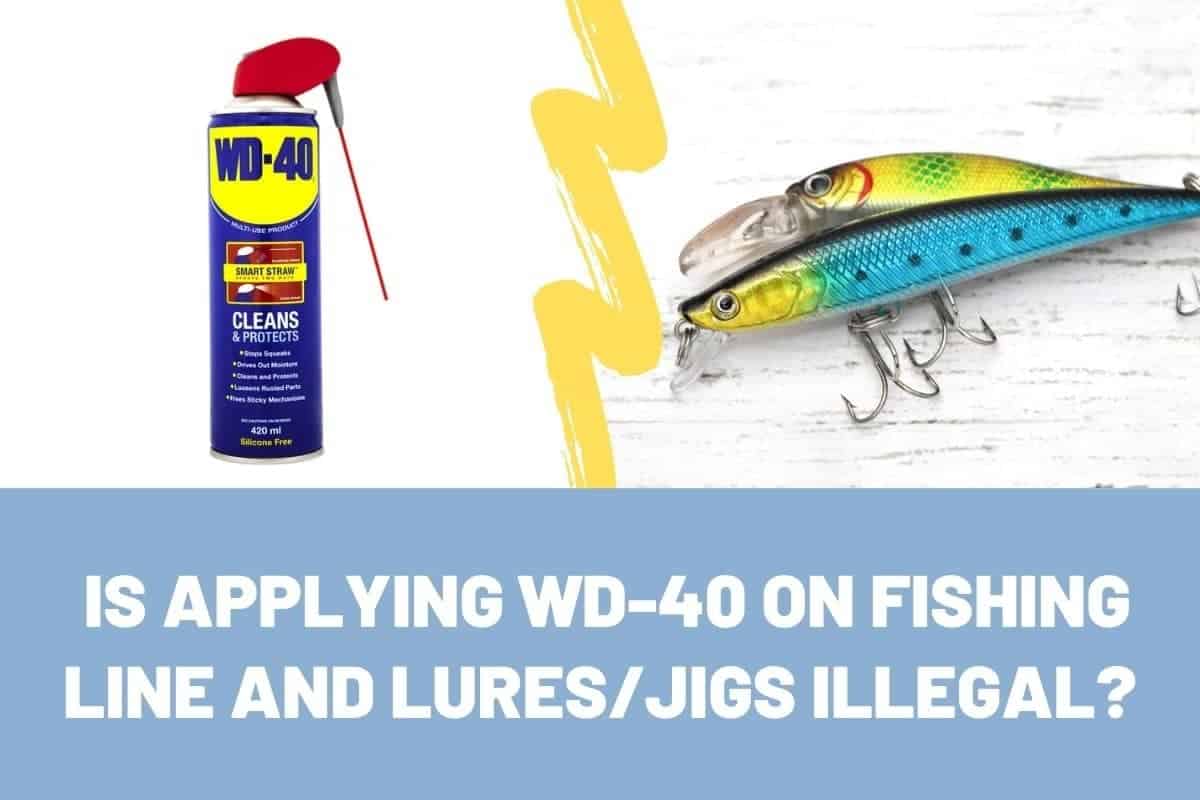
The need to look after our costly fishing gear has prompted many anglers to try a few alternative products. Although the use of WD-40 is not conventional in the sport of fishing, some anglers swear by it for their lines and lures. It’s a controversial topic that has seen some states ban the use of this particular product.
The below table shows the status of the legality of using WD-40 for fishing per state.
| Name of State | WD-40 Use In Fishing |
|---|---|
| Alaska | Illegal |
| Arizona | Unclear |
| Arkansas | Unclear |
| California | Illegal |
| Colorado | Legal |
| Connecticut | Unclear |
| Delaware | Unclear |
| Florida | Illegal |
| Georgia | Unclear |
| Hawaii | Unclear |
| Idaho | Legal |
| Illinois | Illegal |
| Indiana | Illegal |
| Iowa | Unclear |
| Kansas | Unclear |
| Kentucky | Unclear |
| Louisiana | Unclear |
| Maine | Unclear |
| Maryland | Unclear |
| Massachusetts | Unclear |
| Michigan | Illegal |
| Minnesota | Illegal |
| Mississippi | Unclear |
| Missouri | Legal |
| Montana | Unclear |
| Nebraska | Unclear |
| Nevada | Unclear |
| New Hampshire | Unclear |
| New Jersey | Unclear |
| New Mexico | Unclear |
| New York | Unclear |
| North Carolina | Unclear |
| North Dakota | Unclear |
| Ohio | Unclear |
| Oklahoma | Unclear |
| Oregon | Illegal |
| Pennsylvania | Unclear |
| Rhode Island | Unclear |
| South Carolina | Illegal |
| South Dakota | Unclear |
| Tennessee | Unclear |
| Texas | Illegal |
| Utah | Illegal |
| Vermont | Unclear |
| Virginia | Unclear |
| Washington | Illegal |
| West Virginia | Unclear |
| Wisconsin | Unclear |
| Wyoming | Unclear |
If you live in one of the states where WD-40 is illegal to use on fishing tackle (or introduce to the water system), worry not!
Many alternatives are safe for the environment and won’t land you in hot water with the law. We have found some store-bought options and homemade solutions for you to try.
Always Double-Check Your Local Fishing Regulations To See If WD-40 Is Legal
The development of new tests and new product formulae result in regulations constantly being reviewed. They may change from time to time, and you should frequently check your local regulations to ensure you comply with the state’s safety standards.
WD-40 in small amounts might not be the problem for its effect on the ecosystem, but contaminating sensitive waterways with petroleum-based lubricants could see you getting a hefty fine.
What Is The Potential Risk Of Using WD-40 On Your Fishing Line or Bait?
The WD-40 company states that they do not recommend using their product as an attract fish.
The misconception that fish are attracted to it is unfounded. According to the WD-40 Product Sheet, WD-40 contains ingredients harmful to your nervous system if ingested or inhaled.
Below is a list of some of the risks of using WD-40 on your line or bait.
Potential Risks of WD-40 on Lines or Bait:
- It is risky to eat fish that have digested the harmful toxins on the lure.
- Fluorocarbon lines will become brittle and harden over time.
- The petroleum-based oil lubricant can pollute waterways.
- You could accidentally ingest the lubricant when handling the bait and line.
What Is WD40 Made From?
The manufacturer strongly protects their “secret recipe” but needs to declare any hazardous ingredients by law. The entire list of ingredients remains confidential apart from the chemicals in WD-40 as listed on their safety data sheet included as potentially hazardous.
The three ingredients are the following:
- Aliphatic Hydrocarbon
- Petroleum-based oil
- Carbon dioxide
WD-40 is mistakenly rumored to contain fish oil, which is why the company believes that many anglers thought the product was attracting fish to their lures that had been treated with this multi-purpose spray.
Will WD40 Damage The Environment?
The amount of this product that would be introduced in the body of water may be minimal, as proclaimed by anglers who use WD-40, and on its own would not likely pose a threat to the environment. But the cumulative effect of all the petroleum-based oils is something to be concerned about.
The WD-40 Company is quoted to say:
“WD-40 Company has taken steop to respect the conserve the environement, and encourages its users to do the same”
If we are also concerned with protecting the waterways and ecosystems we enjoy, we need to avoid harming or polluting the environment in every way possible.
There are environmentally safe products available for the specific purpose of protecting fishing line and tackle, and they should be used instead of a potentially harmful one.
Recognized Fishing Line Conditioners and Bait Scent Enhancers
We have found some highly recommended line conditioners and bait scents or attractors available for more environmentally friendly use.
Line Conditioners:
- Kevin VanDam’s – Line & Lure
- Reel Snot
- Ardent – Line Butter Conditioner
Bait Scents/Attractors:
- Baitmate – Fish Attractant
- Berkley – Gulp! Alive!
- Smelly Jelly – Pro Guide
Even though all of these products are specifically developed to be safe for fish to consume, always make sure to check your local authority’s regulations.
Homemade Fishing Line Conditioners
A fishing line lubricant’s main aim is to protect your line from drying out and becoming brittle, and it can also reduce line memory to improve your cast.
If you are pressed for time and can’t get to a store for the commercial line lubricants, why not try some homemade fishing line lubricants you have probably got in your home right now.
Using WD-40 In The Long Term
Even though some states still allow the use of WD-40 on your fishing line or bait, there have recently been numerous changes for environmental protection. Therefore, it’s a matter of time before products like WD-40 become illegal to use for fishing applications.
So instead, start trying out other safer options and work on your angling techniques rather than hoping for a magical spray to help you catch fish.
Happy Fishing & Tight Lines
